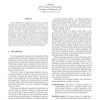Free Online Productivity Tools
i2Speak
i2Symbol
i2OCR
iTex2Img
iWeb2Print
iWeb2Shot
i2Type
iPdf2Split
iPdf2Merge
i2Bopomofo
i2Arabic
i2Style
i2Image
i2PDF
iLatex2Rtf
Sci2ools
103
click to vote
LICS
2005
IEEE
2005
IEEE
Process Algebras for Quantitative Analysis
In the 1980s process algebras became widely accepted formalisms for describing and analysing concurrency. Extensions of the formalisms, incorporating some aspects of systems which had previously been abstracted, were developed for a number of different purposes. In the area of performance analysis models must quantify both timing and probability. Addressing this domain led to the formulation of stochastic process algebras. In this paper we give a brief overview of stochastic process algebras and the problems which motivated them, before focussing on their relationship with the underlying mathematical stochastic process. This is presented in the context of the PEPA formalism.
Computer Science | LICS 2005 | Mathematical Stochastic Process | Process Algebras | Stochastic Process Algebras |
Related Content
| Added | 25 Jun 2010 |
| Updated | 25 Jun 2010 |
| Type | Conference |
| Year | 2005 |
| Where | LICS |
| Authors | Jane Hillston |
Comments (0)

